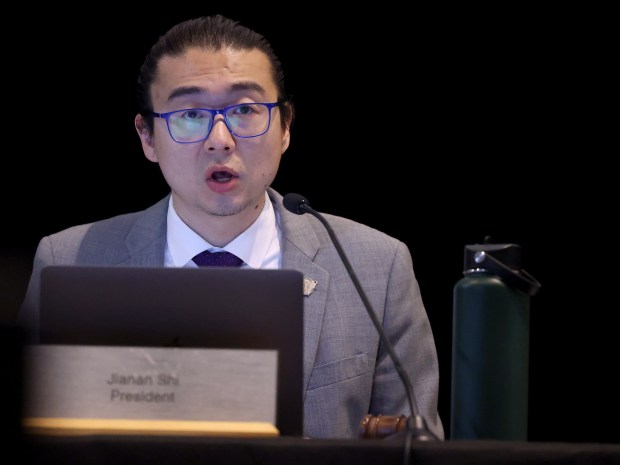As tomorrow’s Board of Education meeting approaches, a publicized miscommunication between Chicago Public Schools leadership and board president Jianan Shi may signal a rift just when chief executive Pedro Martinez needs the board’s support most.
In response to what the Chicago Public Schools’ communications team initially called a “joint statement,” sent to press Tuesday afternoon, Shi posted to his X page at 7 p.m. that it was, in fact, “not a joint statement.”
“As Board President, I am just seeing this now,” Shi wrote regarding the district’s comments, which declared that the Board of Education had “no plans to take action” on Martinez’s contract at the upcoming meeting, and would also not consider the question of taking out a high-interest loan to cover CPS’ budget gap. Mayor Brandon Johnson has advanced the borrowing plan, which Martinez has continued to oppose – most recently in a Tribune editorial Tuesday which confirmed rumors that the CEO declined Johnson’s request that he resign.
In the statement, CPS also again refuted claims of planned school closures – which the Chicago Teachers Union continued to accuse the district of planning at a public bargaining session later that night.
Amidst the session, a CPS spokesperson said the statement had mistakenly been billed as a joint declaration due to an “internal misunderstanding” as they “rushed” to produce a statement – however, they emphasized that the message was still otherwise accurate.
Aside from clarifying that the statement should not have been attributed to the Board, in his post to X, Shi did not comment on whether CPS’ assertions were accurate.
The Board President did not immediately respond to a request for comment.
Illinois state statute and a resolution the Board will vote on Thursday indicate closures are extremely unlikely through at least the end of the current school year.
District guidelines on potential school closures, consolidations, and boundary changes—which state law mandates school districts develop and make publicly available each school year—do not allow for closures or consolidations this year, CPS noted in its statement.
The Board will also vote Thursday on a resolution that further places a moratorium on any “closures, consolidations, and phase-outs” for CPS institutions, until the end of the 2026-27 school year.
“References to school closures and co-locations is a tactic to provide more chaos and uncertainty, to steal precious time away from delivering a world-class education to our children,” CPS wrote.
On Tuesday Martinez said he had no plans to resign or close schools and the board will consider a resolution on extending the moratorium on school closures to 2027. The current statewide moratorium was set to expire in 2025.


However, CTU Vice President Jackson Potter held up a list at Tuesday’s public bargaining session that the union obtained stating it detailed schools being considered for closures and consolidations.
President Stacy Davis Gates pressed the CPS officials present for answers as to why the list was created and who asked for it. Bogdana Chkoumbova denied that the district proposed closing schools, to which Davis Gates repeatedly emphasized that “there is more than one way to close a school.”
“I see what you said and how you said it, but I’m also looking at the schools on the list and seeing how they’ve been starved of resources which everyone in here knows is a condition for closures.” Davis Gates said.
Potter also said the list detailed that a “number of sustainable schools would be folded into existing schools.” The union is advocating for the number of “sustainable schools” to be increased to 200 by the end of the 2027-28 school year.
The district currently has 20 sustainable community schools, which are fully funded and staffed schools that offer comprehensive support to students and their families. Speakers at Tuesday’s bargaining session spoke to the impact of sustainable community schools on their students, with parents, a student and a teacher stepping to the podium.
“[Sustainable community schools] means so much to me… to my community… to my kids,” a parent of Christian Fenger High School said. “It allowed my kids to have their name back. They’re not a zip code, she said.

Davis Gates said they’re looking for expansion of sustainable community schools. She doesn’t want to continue a “back and forth” with the district, she simply wants Martinez to do his job.
“Pedro ain’t got to prove he want to do something good for Chicago Public Schools, he can do it already,” Davis Gates said. “This idea that he needs permission or more air time to get it done is ridiculous. We have a CEO who is working harder at keeping his job and making the press rounds than he is with talking to [representatives] for school funding for our schools. It’s embarrassing.”
Last week, the union announced its House of Delegates passed a vote of “no confidence” in Martinez’s leadership “in light of his failures to urgently address the needs confronting the district and embark on the transformation of our schools,” according to a news release.
Though any potential termination of Martinez’ contract does not appear on the Board of Education’s agenda for Thursday, he is up for a performance review in January. To lose his position, he would have to be voted out by the full Board of Education. Even then, if fired without cause, he would be entitled to stay on his job for about a six-month “transition period” and then receive 20 weeks of severance pay.
If the board were to fire Martinez “for cause,” his contract would be terminated immediately without severance pay.
Firing “for cause,” according to the contract, could be for a number of reasons, including incompetence in the performance of job duties; fraud or misappropriation; negligence; cruelty; immorality; criminal activity; or exercising poor judgment on a serious matter that reflects poorly on CPS or the board. The contract also states that “a finding of wrongdoing or recommendation for disciplinary action, up to and including termination,” will follow an investigation by an overseeing Office of Inspector General or any designated investigative entity.





